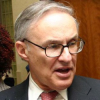Leon Kass

Leon Kass
Leon Richard Kassis an American physician, scientist, educator, and public intellectual, best known as proponent of liberal education via the "Great Books," as an opponent of human cloning, life extension and euthanasia, as a critic of certain areas of technological progress and embryo research, and for his controversial tenure as chairman of the President's Council on Bioethics from 2001 to 2005. Although Kass is often referred to as a bioethicist, he eschews the term and refers to himself as "an...
NationalityAmerican
ProfessionEducator
Date of Birth12 February 1939
CountryUnited States of America
We do restrict so-called reproductive freedom. We do not allow polygamy, we do not allow incest, we do not allow the buying and selling of babies.
What does it mean to be an individual? What does it mean to flourish?
Nobody knew in advance that in vitro fertilization would be, by and large, safe.
I believe that if we really do pour our resources into these alternatives, ... we might find a morally unproblematic and uncontroversial way to get this research done.
It is not the issue I want my own work solely remembered for.
to consider not just the technologies ... but also to see how those things which impinge on our humanity, in fact, touch our personal aspirations, our human longings, our duties.
One should proceed with caution. We may simply not be wise enough to do some of the kinds of engineering things that people are talking about doing.
Limits have to be set on how far one can simply use the... cleverness that we have to make changes.
We are on the threshold and may have already crossed the threshold of a large crisis of long-term care.
We should never rush into folly just because other nations are practicing it.
It seems to me that a kind of thinking which is not technocratic has an opportunity for a renaissance in this country.
There were certain questions about the foundations of morals that advances in science all threaten to make more complicated.
There's an ancient tension between wanting to savor the world as it is and wanting to improve on the world as given.
Genetics is crude, but neuroscience goes directly to work on the brain, and the mind follows.